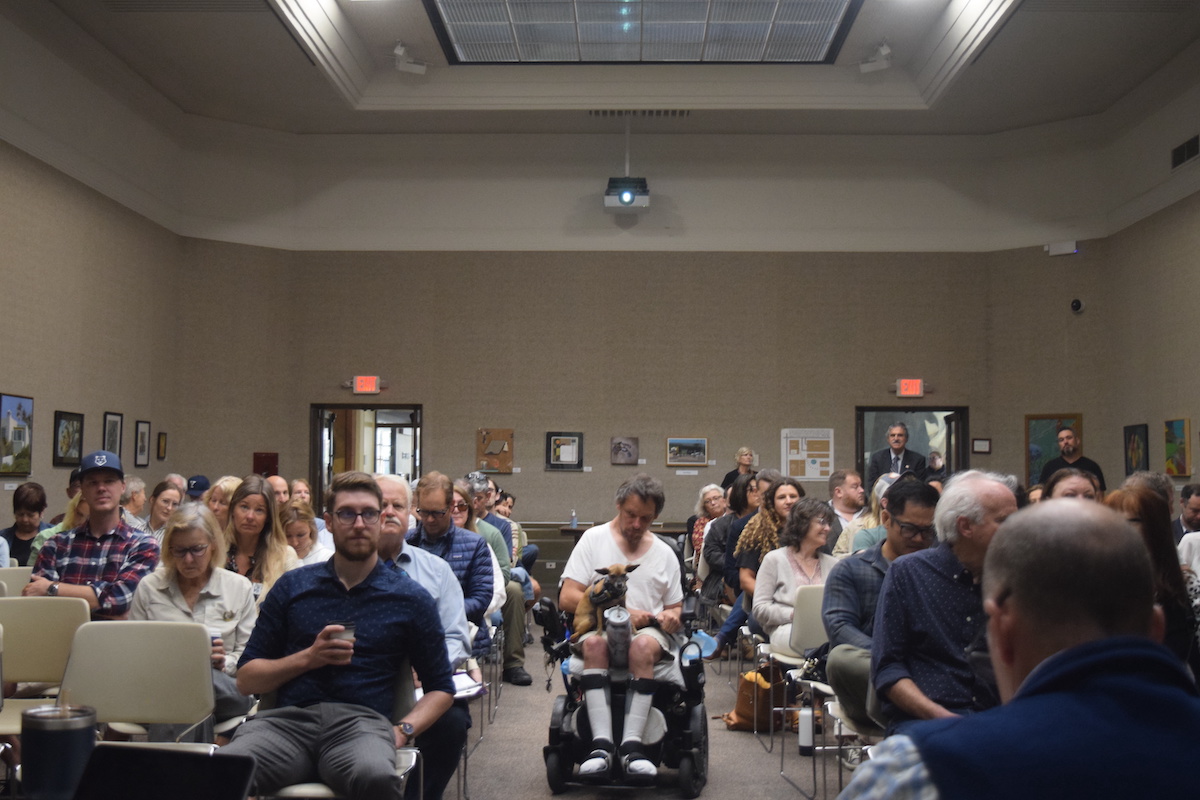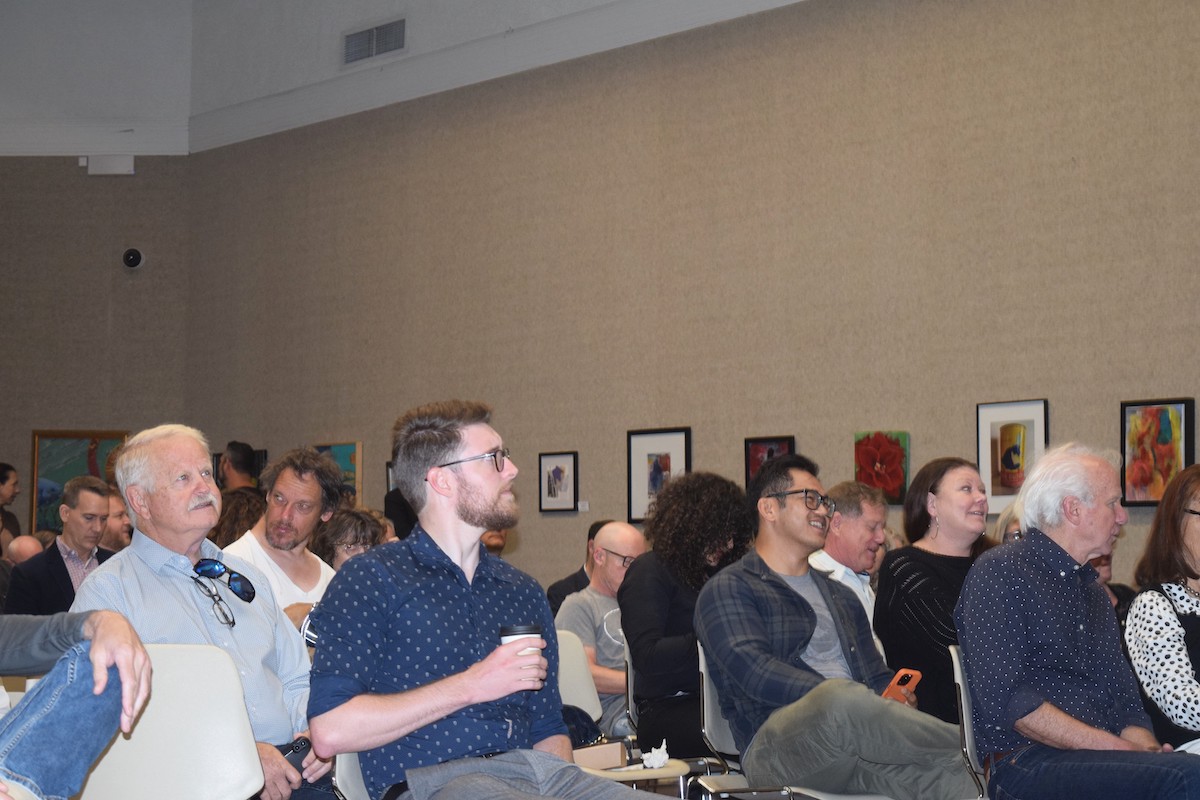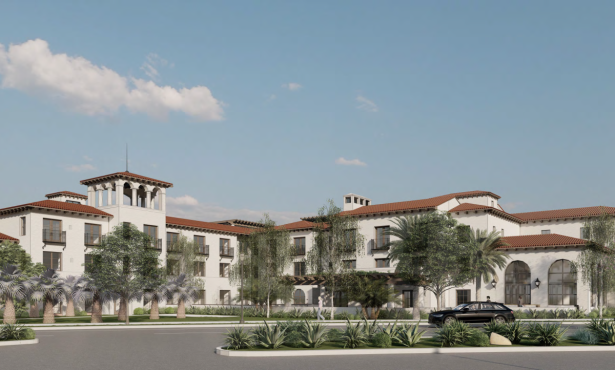Downtown Santa Barbara’s Biggest Question: Parklets or No Parklets?
Residents and Business Owners Pack Early Morning Meeting to Give Input on Future of Outdoor Dining

[Updated: Wed., June 21, 2023, 9:48am]
The future of downtown Santa Barbara and its outdoor dining parklets has bubbled into one of the most polarizing topics in the city. So it came as a bit of a surprise when the city announced an awkwardly timed public meeting to discuss the subject, scheduled for 8:30 a.m. the Tuesday after a three-day, two-holiday weekend. By any standards, it was probably not the best time to ask for public opinion on an important issue.
But even with an early start time in what may be the hardest room to find in the downtown area — the Faulkner Gallery at the Central Library, which is currently fenced off for construction on all sides except for one small door at the back entrance — the meeting was packed with people eager to give their varied opinions on what should happen with these outdoor parklets when the temporary order allowing them runs out at the end of the year.
Downtown Manager Brian Bosse asked the standing-room-only audience to give input on three specific issues: parklets along the State Street Promenade; parklets on private property, such as restaurant parking lots; and “off State Street” parklets, such as those along Ortega, Haley, and Coast Village Road. The City Council would use this input, along with the results of a citywide survey that has already received thousands of responses, to potentially make a decision on the parklets as early as next week.
“We’re here to listen,” Bosse said, nearly drowned out by the sounds of jackhammers just outside the gallery. The construction disrupted the meeting several times, frustrating both city staff and the audience who struggled to hear comments. “We want to hear what you’ve got to say.”
Dozens of city residents, restaurateurs, retail business owners, and property managers spoke up during the meeting, with several criticizing the city’s choice of venue and the last-minute nature of the event. “It seems like you really don’t want input from the public,” one resident said.

The nearly 90-minute public comment session was full of contradictory and passionate opinions. Some celebrated the city’s willingness to turn the once “dull State Street” into a “vibrant promenade” in response to the pandemic; others claimed the closed-off street clogged the city’s main artery; a few questioned the aesthetics of the parklets and suggested that the city scrap them all until a more permanent plan is decided.
Sharon Rich, founder of nonprofit Friends of State Street, said the city was at a crossroads, but there might be a danger of losing some of downtown’s newfound vibrancy if the temporary parklets were not allowed to stay.
She pointed to the holiday weekend as an example: “On Saturday, table after table was filled; kids were learning to ride their bikes, some carrying ice cream cones; there were artists’ markets.”
Others pointed to the effects on retail shops. While the parklets benefit the restaurants who can offer outdoor dining, the nearby shops have not experienced the same boost in revenues.
Jim Knell — founder and chair of SIMA Corporation, which owns multiple downtown properties — called the whole experiment a “boondoggle” that only subsidizes and benefits restaurants. “It’s shortsighted,” he said. “Retail can’t survive.”
Good Lion Hospitality director of operations Adam Sandroni provided one of the most solid case studies of what happens to businesses with parklets versus those without. He oversees three different locations: one with a parklet on State Street, one without, and one with a half-parklet in the Funk Zone. To him, the proof is in the numbers. Revenue is up 30 percent at the location with a parklet, up 15 percent at the location with a half-parklet, and down 30 percent at the spot with no parklet.
Some argued that State Street should be opened back up, but the majority of the speakers supported some sort of outdoor dining going forward. One restaurant owner said it was wrong to pit retail against restaurants, saying it was “unfair to say one is winning.”
Bob Stout, owner of the Wildcat Lounge, was among those who felt that the city was making the decision too quickly. He was worried that the process was too “frontloaded,” with a last-minute meeting called just a week before the City Council makes a potentially detrimental decision.
Mayor Randy Rowse was in attendance at the meeting, along with city councilmembers Kristen Sneddon and Oscar Gutierrez and several city staff members. But one person not at the meeting was City Administrator Rebecca Bjork, who has earned criticism behind closed doors for recommending the city put an end to the parklets. Bjork, according to City Hall sources, will be on vacation out of the country for the next five to six weeks.
In a subsequent email to the Independent, Bjork said: “This is not the case. I am a big fan of outdoor dining and believe it brings enlivenment to downtown and our other areas of the city. I am concerned about the safety of placing diners in an active roadway.”
She said that the City Council has made it clear that State Street parklets should remain until the city’s master plan is completed, but the direction is less clear on what to do with parklets outside of the State Street promenade. “We are trying to get counsel input on [the City Council’s] direction now to give us time to implement any changes to ordinances or rules ahead of the expiration of the Economic Recovery Extension and Transition Ordinance,” she said.
On Tuesday, June 27, the City Council will discuss the future of outdoor dining on State Street, private property, and other public areas off State Street. The city could decide to either end or extend the temporary order for all three. To participate in the city’s survey, visit surveymonkey.com/r/98TDC7Z.
Editor’s Note: This story has been updated to add comments from City Administrator Rebecca Bjork.




You must be logged in to post a comment.